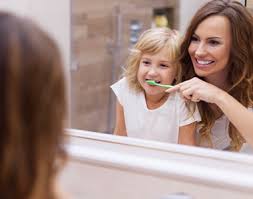Maintaining good oral hygiene from a young age is crucial for children’s overall health and well-being. Establishing healthy dental habits early can prevent a range of oral issues, including cavities, gum disease, and misalignment problems. As parents, it’s your job to instill these habits in your children in a fun and engaging way. In this comprehensive guide, we’ll explore effective strategies to encourage good oral hygiene in kids, ensuring they develop lifelong dental health habits.
1. Start Early: The Foundation of Good Oral Hygiene
Begin Oral Care Before Teeth Erupt
Oral hygiene should start even before your child’s first tooth appears. Gently wipe your baby’s gums with a clean, damp cloth after feedings. This practice helps remove bacteria and gets your child accustomed to oral care.
Introduce a Toothbrush Early
Once your baby’s first tooth emerges, introduce a soft-bristled toothbrush designed for infants. Make brushing a part of your daily routine, even if it’s just a quick brush to get your child used to the sensation. Choosing a toothbrush with a small head and a comfortable grip will make brushing easier for both you and your child.
2. Make Brushing Fun
Incorporate Games and Music
Kids are more likely to brush their teeth if it’s a fun activity. Use games, songs, or apps that are designed to make brushing enjoyable. For instance, playing a two-minute song or using a timer can help kids brush for the recommended duration. There are also plenty of interactive apps that turn brushing into a game.
Choose Fun and Flavorful Products
Let your child pick out their toothbrush and toothpaste. There are many child-friendly options with fun colors and flavors. A toothbrush featuring their favorite cartoon character can make brushing more appealing. Just be sure to use toothpaste that is appropriate for their age.
3. Establish a Routine
Create a Brushing Schedule
Consistency is key to developing good oral hygiene habits. Establish a brushing routine that includes brushing twice a day—once in the morning and once before bed. Create a visual schedule with pictures to remind your child when it’s time to brush.
Set a Good Example
Children often mimic their parents’ behaviors. Brush and floss your teeth alongside your child to demonstrate the importance of these activities. Show enthusiasm about dental care, and your child is likely to follow suit.
4. Educate Your Child
Teach the Importance of Oral Hygiene
Explain to your child why brushing and flossing are important for their health. Use simple, age-appropriate language to discuss how brushing helps remove food particles and bacteria that can lead to cavities. Educational books and videos about dental health can also be helpful.
Use Positive Reinforcement
Praise your child for brushing their teeth properly and for taking care of their oral hygiene. Consider using a reward system, such as a sticker chart, to encourage consistent brushing. Positive reinforcement can motivate your child to maintain good habits.
5. Encourage Healthy Eating Habits
Limit Sugary Snacks and Drinks
A key component of good oral hygiene is a balanced diet. Limit your child’s intake of sugary snacks and drinks, as these can contribute to tooth decay. Instead, offer healthy snacks like fruits, vegetables, and cheese, which can help promote strong teeth.
Promote Water Consumption
Encourage your child to drink water throughout the day. Water helps wash away food particles and reduces the risk of cavities. It’s also a healthy alternative to sugary drinks like soda and fruit juices.
6. Schedule Regular Dental Visits
Visit the Dentist Regularly
Regular dental check-ups are essential for maintaining good oral health. Schedule your child’s first dental visit by their first birthday or when their first tooth emerges. Regular visits allow your Orthodontist Houston TX to monitor your child’s dental development and address any issues early.
Discuss Dental Health with Your Dentist
During dental visits, talk to your dentist about any concerns you may have regarding your child’s oral hygiene. Your dentist can provide personalized advice and reinforce the importance of good dental care.
7. Address Dental Issues Promptly
Treat Dental Problems Early
If you notice any signs of dental problems, such as discoloration, sensitivity, or pain, address them promptly. Early intervention can prevent more serious issues down the line and ensure your child maintains optimal oral health.
Teach Proper Flossing Techniques
Flossing is an important part of oral hygiene, but it can be challenging for young children. Teach your child how to floss properly, or assist them in flossing until they are able to do it on their own. Start with floss picks if traditional floss is too difficult for them to handle.
8. Foster a Positive Attitude Towards Dental Care
Reduce Dental Anxiety
Some children may feel anxious about dental visits or brushing their teeth. To reduce anxiety, explain dental procedures in a positive, reassuring manner. Use a gentle approach and avoid using dental visits as a threat or punishment.
Make Oral Care a Family Activity
Involve the whole family in oral hygiene practices. Having everyone brush and floss together can make dental care a fun, family-oriented activity. This not only sets a good example but also creates a supportive environment for your child.
9. Be Patient and Persistent
Understand That Habits Take Time
Developing good oral hygiene habits doesn’t happen overnight. Be patient and persistent with your child as they learn the importance of brushing and flossing. Consistency and encouragement will help them form lasting habits.
Adjust Strategies as Needed
Every child is different, so be prepared to adjust your strategies based on your child’s preferences and needs. If one approach isn’t working, try another until you find what motivates your child to maintain good oral hygiene.
Conclusion
Encouraging good oral hygiene in kids involves a combination of education, routine, and positive reinforcement. By starting early, making dental care fun, and setting a good example, you can help your child develop healthy habits that will last a lifetime. Remember, good oral hygiene is a critical component of overall health, and your efforts will contribute significantly to your child’s well-being. With these strategies, you’ll be well on your way to ensuring your child enjoys a bright and healthy smile for years to come.




